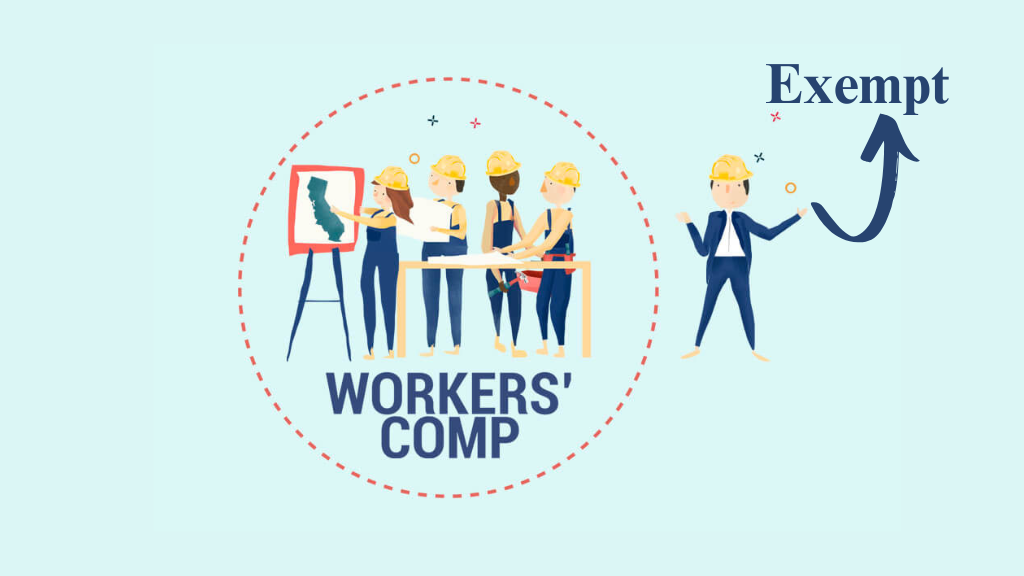Hugh Pham | Insurance Agency Principal
Do 1099 Employees Need Workers Compensation in California?
See How We're Different
or call us: 866-226-4436
Are you a 1099 employee or a self-employed contractor in California? You may not realize it, but this distinction could significantly affect your workers' compensation coverage. As an independent worker, you are likely familiar with some risks associated with going without traditional employment benefits and payroll taxes.
While anyone can be injured on the job regardless of their employment status, understanding whether or not you need Workers' Compensation coverage in California is crucial to protecting yourself from financial liability in the event of an accident.
Read on to learn more about 1099 Employees and whether they require workers’ compensation insurance in California.
What is a 1099 Employee in California?
In California, a "1099 employee" is a term often used to refer to individuals classified as independent contractors who receive Form 1099-MISC or Form 1099-NEC for tax reporting purposes. The number 1099 refers to the specific tax form used to report income earned by independent contractors and self-employed individuals.
A 1099 employee is not technically an employee in the traditional sense. Instead, they are considered self-employed individuals who provide services to businesses or clients on a contract basis. They are responsible for paying their own taxes, including self-employment taxes, and generally have more control over when, where, and how they work compared to traditional employees.
The classification of a worker as a 1099 employee or an employee is determined based on various factors, including the level of control exercised by the hiring entity over the work performed, the nature of the work relationship, and the degree of independence of the worker.
What Are the Rules for 1099 Employees in California?
In California, the classification of workers as either employees or independent contractors is determined by the "ABC test," which was established under Assembly Bill 5 (AB5) and further clarified by Proposition 22. The ABC test sets forth three criteria that must all be met for a worker to be considered an independent contractor:
- Control: The worker must be free from the control and direction of the hiring entity in connection with the performance of their work, both under contract terms and in actual practice.
- Business: The worker must perform work that is outside the usual course of the hiring entity's business. In other words, the worker should be providing services that are different from the core activities of the hiring company.
- Independent: The worker must be customarily engaged in an independently established trade, occupation, or business of the same nature as the work they perform for the hiring entity.
The worker may be classified as an independent contractor if all three criteria are met. However, if any one of the criteria is not met, the worker is more likely to be considered an employee.
It's important to note that the rules and regulations regarding worker classification can be complex, and there are exceptions and nuances to consider. Some industries have specific exemptions or alternative tests. For example, Proposition 22 created a separate classification for app-based drivers (such as those working for ride-sharing companies), who are generally treated as independent contractors with certain benefits and protections.
Difference Between 1099s and Employees in California
In California, there are significant differences between individuals classified as 1099 independent contractors and those classified as employees. Here are some key distinctions:
- Control and Independence: Employees typically work under the control and direction of their employer, who dictates how, when, and where the work is performed. In contrast, independent contractors have more autonomy and control over their work, including the freedom to choose their own methods, schedules, and locations.
- Tax and Withholding: Employees have their income taxes and Social Security/Medicare taxes withheld from their paychecks by their employer. Employers are also responsible for contributing to these taxes on behalf of their employees. 1099 employees, on the other hand, are responsible for handling their own taxes, including paying self-employment taxes and making estimated tax payments.
- Benefits and Protections: Employees are entitled to various benefits and protections under California labor laws. This includes minimum wage, overtime pay, paid sick leave, meal, and rest breaks, workers' compensation coverage, unemployment insurance, and anti-discrimination and harassment protections. Independent contractors are not generally eligible for these benefits and protections unless they are misclassified and should be considered employees.
- Worker Classification: The classification of a worker as an employee or a 1099 employee is determined based on several factors, such as the level of control exerted by the hiring entity, the nature of the work relationship, and the degree of independence of the worker. Misclassifying workers is a concern in California, as misclassified employees may be entitled to the benefits and protections afforded to employees.
- Liability and Insurance: Employers typically have liability for the actions and behavior of their employees within the scope of their employment. They are also required to provide workers' compensation coverage for their employees. 1099 employees, however, are generally responsible for their own actions and are not covered by workers' compensation unless they voluntarily obtain coverage.
What is Workers Compensation and Who Does It Cover in California
Workers' compensation is a system of insurance that provides benefits to employees who suffer work-related injuries or illnesses. In California, workers' compensation coverage is mandatory for most employers and offers various protections and benefits to employees.
Here is an overview of workers' compensation in California, including who it covers:
Coverage:
- Employees: Workers' compensation covers employees, including full-time and part-time workers, who are injured or become ill as a result of their job duties.
- Temporary and Permanent Employees: Both temporary and permanent employees are covered under workers' compensation laws in California.
- Agricultural Workers: Agricultural workers, including farm laborers and agricultural contractors, are eligible for workers' compensation coverage.
Benefits:
- Medical Expenses: Workers' compensation covers reasonable and necessary medical expenses related to work-related injuries or illnesses. This includes doctor visits, hospital stays, surgeries, medications, and rehabilitation services.
- Disability Benefits: Employees who are temporarily or permanently unable to work due to their job-related injury or illness may receive temporary or permanent disability benefits to replace lost wages.
- Lost Wages: Workers' compensation benefits may include payment for lost wages while an employee cannot work due to their injury or illness.
- Vocational Rehabilitation: In some cases, workers' compensation provides vocational rehabilitation services to help injured employees return to work or find alternative employment if they cannot perform their previous job.
- Death Benefits: If a worker dies due to a work-related injury or illness, workers' compensation provides death benefits to their dependents, including financial support and burial expenses.
Are 1099 Employees Covered by Worker’s Compensation in California
1099 employees (independent contractors) are not covered by workers' compensation in California. Workers' compensation benefits are typically available to employees, but independent contractors are not classified as employees. Independent contractors are responsible for their own insurance coverage, including any necessary liability or disability insurance.
However, it's worth noting that misclassification of workers is a concern in California, and misclassified employees may have grounds to challenge their classification and seek workers' compensation benefits.
If it is determined that a worker has been misclassified as an independent contractor, they may be entitled to the benefits and protections afforded to employees, including workers' compensation.
Benefits of Having Workers Compensation for 1099 Employees
While 1099 employees are generally not covered by workers' compensation in California, there can still be potential benefits for independent contractors to obtain workers' compensation coverage voluntarily. Here are a few reasons why a 1099 employee might consider having workers' compensation:
- Personal Protection: Workers' compensation coverage provides benefits in the event of a work-related injury or illness. By voluntarily obtaining workers' compensation, independent contractors can have financial protection and access to medical care if they suffer an injury or illness while performing work for a client.
- Client Requirements: Some clients or companies may require independent contractors to have workers' compensation coverage as part of their contract agreement. By obtaining coverage, independent contractors can meet these requirements and enhance their professional reputation and credibility.
- Expanded Opportunities: Having workers' compensation coverage may open up new opportunities for independent contractors. Certain clients, particularly larger corporations or government entities, may prioritize working with contractors with workers' compensation coverage. This coverage allows independent contractors to position themselves as more attractive candidates for these projects.
- Misclassification Challenges: There may be situations where a 1099 employee believes they have been misclassified and should be considered an employee entitled to workers' compensation benefits. In such cases, voluntarily obtaining workers' compensation coverage can help provide a safety net while navigating the legal process to challenge misclassification.
- Peace of Mind: Workers' compensation coverage as a 1099 employee can bring peace of mind and financial security. It ensures that if an unforeseen work-related injury or illness occurs, there is a safety net in place to assist with medical expenses, lost wages, and other related costs.
How Can I Get Workers’ Compensation Coverage for My 1099 Employees in California?
You can choose to voluntarily provide workers' compensation coverage for your 1099 employees, even though it is not legally required. Voluntary coverage ensures that your independent contractors have access to medical benefits and other benefits provided by workers' compensation in the event of a work-related injury or illness.
To obtain voluntary coverage, you would need to contact an insurance carrier licensed to provide workers' compensation insurance in California and discuss your options.
Have Questions? Talk to Us Today!
If you have any questions about providing workers' compensation coverage for your 1099 employees in California, our experienced team of insurance professionals is here to help. Our experienced agents can help you navigate the process of obtaining voluntary coverage and answer any questions you have about workers' compensation for independent contractors.
Contact Western Insurance Marketing Corporation today for more information and to get started with a free customized quote. We look forward to helping you provide the protection your 1099 employees need.
Recent News










Western Insurance
Marketing Corporation
Since 1963, Western Insurance Marketing Corporation, an independent insurance agency, has offered coverage clients require with the power of choice from top-rated national and regional insurance carriers.
9340 Bolsa Ave, Westminster, CA 92683
CA License #: 0548614
We are licensed in all 50 states, AZ, CA, CO, NM, NV, OR, TX, and WA.
All Rights Reserved | Western Insurance Marketing Corp. | Privacy Policy | Legal Disclaimer


